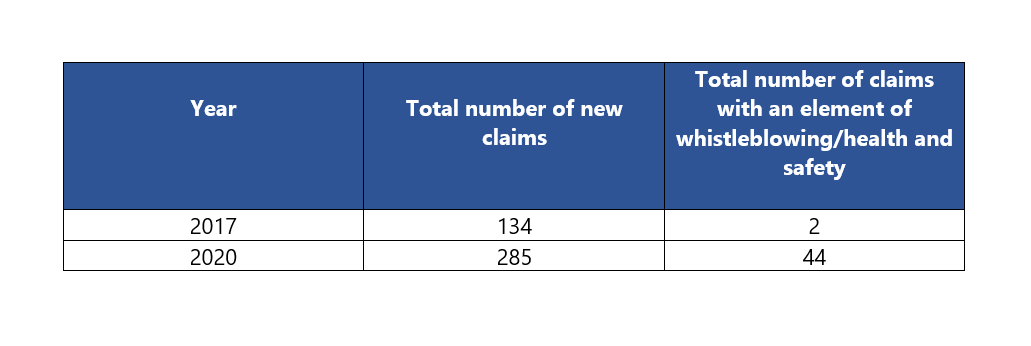BLOG
Whistleblowing claims soar as businesses prepare for a return to work

Prior to March 2020, you likely had a fair handle on the sorts of employee issues that generally crop up within your business and, if asked, you could probably anticipate the types of claims employees may try and bring against you.
But alongside everything else that employers have had to contend with in the past 12 months, COVID-19 has created a perfect breeding ground for a different sort of claim: whistleblowing.
It’s a term you might not be too familiar with in the usual course of events, but it’s one that employers must be alert to, as evidence is emerging of a sudden increase in COVID-related whistleblowing reports and litigation.
What is whistleblowing and why now?
It’s important that workers can report illegal acts and other serious wrongdoing committed by their employer without fearing repercussions. As such, the Public Interest Disclosure Act gives these individuals – commonly referred to as ‘whistleblowers’ – protection against being victimised, disciplined, dismissed or otherwise treated unfairly for speaking out about malpractice (otherwise referred to as making a ‘protected disclosure’).
In the context of COVID-19, there are two main types of protected disclosure that a worker could conceivably make: allegations of furlough fraud and, perhaps most commonly, concerns about the safety of the working environment. According to one survey, 35% of employees who were back in the workplace in September 2020 were concerned about COVID-19 transmission while doing their job. Indeed, reports surfaced earlier this year of employees being forced to go back into workplaces that weren’t COVID-compliant, with 4,000 workers having blown the whistle to the HSE between 6 and 14 January 2021 alone.
If an employee is disciplined, dismissed or feels forced to resign in this scenario, they may have grounds to bring a whistleblowing claim. What’s more, while some disclosures will be made for genuine reasons, others may seek to take advantage of this legal recourse, either by using it as leverage not to attend work or going so far as to bring a claim themselves.
For employers, whistleblowing is much more complex and riskier your average claim. For a start, whistleblowing is considered to be an ‘automatically unfair’ reason for dismissal, meaning that if a worker’s disclosure was the main reason they were dismissed, there is no justification or defence available to the employer. Not only does this give the employee strong footing for a claim, but as the maximum compensation awarded in automatic unfair dismissal cases is uncapped, this further increases the temptation for employees to bring these types of claims, especially at a time when many are at risk of losing their jobs.
Increasing the threat further is the fact that unlike ordinary unfair dismissal, there is no qualifying period of service required to bring a claim – even workers who have been with you for a very short amount of time are eligible to do so. The usual barrier against litigious employers is therefore removed.
And it’s not just the compensation employers need to worry about. These more complex claims incur further financial outlay for employers in respect to the legal costs involved. In fact, our figures indicate that the average Employment Tribunal takes our Litigation Team approximately 87 hours to deal with. Factor in lawyers’ costs of around £200 per hour, and you’re looking at £17,400 in defence costs alone.
Related Content
Do you need support?
Our fixed-fee Employment Law support is approximately 45% cheaper than the hourly cost of a law firm. And, if you underpin this with our independent Legal Expenses Insurance, you will not only get specialist litigation support in the event of a claim, but your costs will be covered if you have taken and followed our advice.
Speak to us for an honest, no obligation chat on:
0345 226 8393 Lines are open 9am – 5pm
The likelihood of claims: A closer look at the statistics
So, what’s the likelihood that employers will find themselves in this scenario?
Well, according to a report by the whistleblowing charity Protect, 41% of employees said they were ignored when raising issues relating to COVID-19 safety measures and possible furlough fraud, and 20% were dismissed for making their concerns known, with managers most at risk.
With this in mind, there is real potential for employees to bring legal action, or for employees who have been otherwise dismissed to seek to exploit this trend (“the real reason I was sacked was because I spoke out about my employer’s safety measures”).
Angela Carter, Head of Ellis Whittam’s Manufacturing Team and Chartered Legal Executive, predicts that whistleblowing claims will be a growing problem for employers in the months ahead.
She said: “Already at Ellis Whittam, we are beginning to see a steady stream of these sorts of claims filtering through now that lockdown restrictions are being eased again, different industries are opening up, and people are being asked to return to workplaces that have been closed for several weeks/months while they have been on furlough. I imagine they will start to come through thick and fast in the months ahead and it’s definitely going to be one of the major issues for employers to deal with this year.”
Indeed, our internal statistics demonstrate just how suddenly this new threat has emerged and how significant it is likely to become. The table below shows the number of claims brought against our clients that include allegations of either whistleblowing (automatic unfair dismissal) or health and safety issues (dismissal or detriment).

Angela Carter, Head of Manufacturing Team
Not only does this demonstrate a general increase in the overall number of claims brought against employers in the last five years – owing in large part to the abolition of Employment Tribunal fees in 2017 – but it clearly shows that those with a whistleblowing or health and safety element have become far more common recently. Indeed, only 1.5% of claims brought against our clients in 2017 were of this nature, compared to a much higher 15.4% in the last year.
Angela said: “While official Employment Tribunal statistics don’t go into such granular detail – grouping these sorts of claims under the broader category of ‘unfair dismissal’ – our own statistics tend to track national stats fairly closely in terms of the types of claim brought against employers, so I’d suspect the trend we’re seeing here at Ellis Whittam wouldn’t be far off the nationwide picture.”
She added: “While certainly alarming, the stats aren’t surprising. COVID-19 has created the perfect breeding ground for these sorts of claims; everyone now has a smartphone or a laptop, and with COVID-19 safety concerns all over the news, it’s firmly in people’s consciousness. Those intent on bringing claims or who are otherwise aggrieved – perhaps because they have been sacked for other, legitimate reasons – can now claim they were dismissed for making a protected disclosure. It’s scary stuff – certainly much more frightening to deal with than your bog-standard unfair dismissal claim.”
What can employers do to protect against whistleblowing claims?
First and foremost, make sure that your safety measures are robust, consistent with government guidance and communicated to all staff. Disclosures made around public safety commonly concern a lack of PPE and provision for social distancing, so start there. If your risk assessment hasn’t been reviewed since early last year, now is the time to revisit it. Are your measures still effective? Are they being followed?
Make sure all employees are considered, as whistleblowing protection applies not just to employees and workers but also agency staff, seconded workers, homeworkers and trainees, too. Give particular consideration to those considered to be vulnerable – you may need to conduct an individual risk assessment with these workers to address their specific circumstances and the associated risks.
Engage with staff, show them your findings, and give them the opportunity to raise questions or concerns. If you absolutely cannot convince them that the workplace is safe, try to find alternative solutions such as homeworking or moving them to non-customer-facing roles.
Don’t ignore concerns. If a protected disclosure is received, follow your internal policy on whistleblowing, which should include meeting with the whistleblower to understand the exact nature of the alleged malpractice, investigating the issue, and writing to the worker with the outcome and the basis for your decision. Importantly, you should:
- Make it clear that the person’s disclosure will not affect their position at work;
- Ensure they are aware that raising genuine concerns will never lead to being penalised/detriment; and
- Take appropriate action if their claims are upheld.
Record everything. This includes your risk assessments, staff communications, any whistleblowing disclosures you receive and details of your investigations. This will allow you to demonstrate that you took all reasonable steps to keep people safe and that workers’ concerns were taken seriously
If in doubt, seek advice at the earliest opportunity.
Proactively protect your business with support from Ellis Whittam
If you’re concerned about the potential for employee claims, our combination of Employment Law, HR and Health & Safety support is the perfect solution – protecting your organisation from all sides.
With Ellis Whittam, you can:
- Consult with your own small team of qualified legal advisers prior to disciplining or dismissing an employee to ensure you are not leaving yourself exposed;
- Ensure robust health and safety measures are implemented and acknowledged;
- Minimise the potential for legal missteps with robust policies and handbooks;
- Implement water-tight procedures on induction and establish clear reporting lines for accidents;
- Put clear channels in place for employees to report issues around factors pertaining to whistleblowing; and
- Get peace of mind with our Legal Expenses Insurance, which will protect your organisation against the financial impact of a claim.
For more information on our fixed-fee support, call 0345 226 8393 or request your free consultation using the button below.
Sign up for the latest news & insights
Resources
Latest News & Insights

Language of appreciation at work | Why individual motivation matters
BLOG Written by Becs Bridge, Director of Learning & Development, on 23 January 2026 In today’s competitive talent market, the organisations that retain top performers

Recruitment trends 2026 | 7 things to expect when hiring this year
BLOG Written by Danielle Fargnoli-Read on 22 January 2026 If there’s one thing recruitment has taught us over the past few years it is that

Breach of employment contract | What employers need to know to avoid Tribunal claims
BLOG Written on 15 January 2026 Breach of contract is a common concern for businesses, particularly during resignations, dismissals, or disputes over pay, notice, or

When does the Employment Rights Bill 2025 come into effect?
BLOG Written on 19 December 2025 It’s been the most talked-about topic in HR in 2025 and the question everyone’s been asking is, “When is

Workforce planning | Structuring your business for success
BLOG Written by Danielle Fargnoli-Read (Updated February 6th 2026) Strategic workforce planning is a vital business process that’ll align your organisational needs with long-term goals.

Changes to day one unfair dismissal rights | New six-month protection explained
BLOG Written by Patrick Carroll-Fogg on 1 December 2025 Of the almost 75 individual tweaks and changes set to be introduced under the Employment Rights

Breaking down the Budget 2025 for employers
BLOG Written by Daniel Rawcliffe on 27 November 2025 The recently announced UK Budget 2025 is a challenging one for small businesses. While it covers

AI for interviews with job candidates | Balancing technology with a human touch
BLOG Written by Danielle Fargnoli-Read and Tracey Burke on 21 November 2025 Businesses using AI for interviews are reshaping the way UK businesses approach hiring,

Workplace risks revealed | HSE 2024/25 report shows rising injuries and ill health
BLOG Written on 21 November 2025 Providing a safe, healthy workplace should be a top priority for all employers. But how well are workplaces actually

